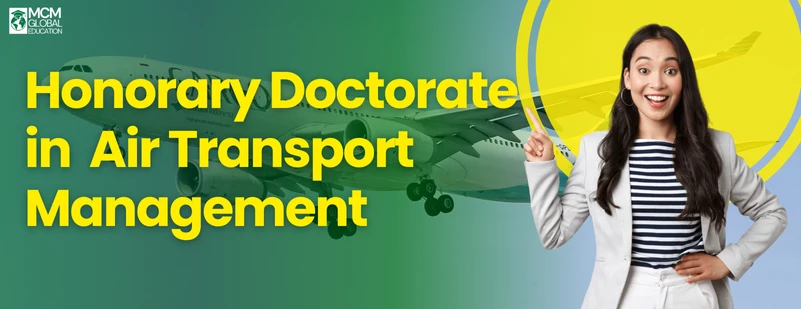The aviation industry is one of the most dynamic sectors worldwide, and Air Transport Management is at the heart of its success. This discipline covers everything from airline operations to airport management, safety regulations, and logistics.
In recognition of exceptional contributions to the aviation sector, many universities confer an Honorary Doctorate in Air Transport Management. But what does this honorary degree mean? How is it different from a PhD or DBA in aviation? And most importantly, what should students know about it?
This detailed guide explains everything you need to know about an honorary doctorate in air transport management, from its meaning and eligibility to its benefits, limitations, and FAQs.
Table of Contents
Understanding Air Transport Management
Before diving into the honorary doctorate, let’s understand the field itself.
Air Transport Management is a specialized discipline that focuses on the efficient and safe operation of the global aviation system. It involves:
- Airline Operations – scheduling, pricing, and route planning.
- Airport Management – passenger flow, security, and ground handling.
- Air Cargo Logistics – managing international trade and supply chains.
- Aviation Safety & Compliance – ensuring adherence to international regulations.
- Aviation Economics & Policy – shaping decisions that impact global connectivity.
With increasing air traffic and technological innovations like green aviation, demand for leaders in air transport management is at an all-time high.
What is an Honorary Doctorate in Air Transport Management?
An Honorary Doctorate in Air Transport Management is a symbolic recognition awarded by universities to individuals who have made extraordinary contributions to the aviation industry.
Unlike an earned doctorate (PhD/DBA), it does not involve coursework, research, or a thesis. Instead, it honors leadership, innovation, and service in the aviation field.
Key points:
- It honors achievements, not academic effort.
- Awardees often include CEOs of airlines, aviation policymakers, safety pioneers, or renowned researchers.
- It enhances prestige but does not replace an academic qualification.
Who Can Receive It?
Students often ask: Can I apply for an honorary doctorate in air transport management? The short answer is no.
This degree is not applied for, but awarded through nominations.
Typical Eligibility Criteria:
- At least 20–25 years of excellence in aviation or related fields.
- Major contributions to aviation safety, technology, or sustainability.
- Global recognition from organizations like IATA, ICAO, or regional aviation authorities.
- Publications, patents, or innovations that transformed the industry.
This makes it an exclusive recognition, reserved for professionals who shape the aviation industry.
How is it Awarded?
The process of awarding an honorary doctorate usually involves:
- Nomination – A candidate is nominated by peers, industry bodies, or academic committees.
- Evaluation – The university senate reviews the candidate’s contributions and global impact.
- Approval – After thorough deliberation, the governing body approves the honor.
- Ceremony – The candidate receives the degree during a convocation, with a citation highlighting achievements.
This structured process ensures only deserving candidates receive the honor.
Benefits of an Honorary Doctorate in Air Transport Management
Although it doesn’t provide academic credit, it carries significant prestige.
| Benefits | Explanation |
|---|---|
| Global Recognition | Adds credibility and respect in both academic and aviation circles. |
| Professional Influence | Opens doors for policy-making, advisory, and leadership roles. |
| Networking Opportunities | Enhances visibility at high-level aviation forums and events. |
| Legacy & Prestige | Serves as recognition of lifelong achievement in aviation. |
| Inspiration | Motivates future generations of students and professionals. |
Limitations Students Should Know
It’s equally important to understand the limitations of this degree:
- Not a substitute for an earned academic doctorate (PhD or DBA).
- Does not qualify for teaching or research positions on its own.
- Should ethically be used with the title Dr. (h.c.), where h.c. means honoris causa.
- Holds symbolic prestige but no academic progression value.
Honorary Doctorate vs Earned Doctorate in Air Transport Management
Here’s a comparison to help students clearly understand the difference:
| Feature | Honorary Doctorate | PhD/DBA in Air Transport Management |
|---|---|---|
| Purpose | Recognition of achievement | Academic research & contribution |
| How Awarded | University nomination | Coursework, research, thesis |
| Duration | None | 3–6 years |
| Eligibility | Industry contribution | Academic qualifications |
| Outcome | Prestige & respect | Academic & career advancement |
Why Universities Confer Honorary Doctorates in Air Transport Management
Universities award honorary doctorates for several reasons:
- To honor leaders and innovators who transformed aviation.
- To inspire students in aviation management programs.
- To strengthen ties between academia and industry.
- To celebrate contributions to sustainability, safety, and efficiency in air transport.
For instance, an airline CEO introducing green aviation technologies or a policymaker shaping global aviation safety standards may be honored.
Frequently Asked Questions (FAQs)
Can I apply for an Honorary Doctorate?
No. It is awarded by nomination only.
Can I use the title “Dr.” after receiving it?
Yes, but ethically it should be written as Dr. (h.c.).
Is it equivalent to a PhD in Aviation or Air Transport Management?
No. A PhD involves years of research; an honorary doctorate is symbolic recognition.
Which universities award it?
Institutions with strong aviation programs or ties to the airline industry, especially in Europe, the US, and Asia.
If I want an academic degree, what should I pursue?
Consider a Master’s in Aviation Management followed by a PhD/DBA in Air Transport Management for academic and career progression.























